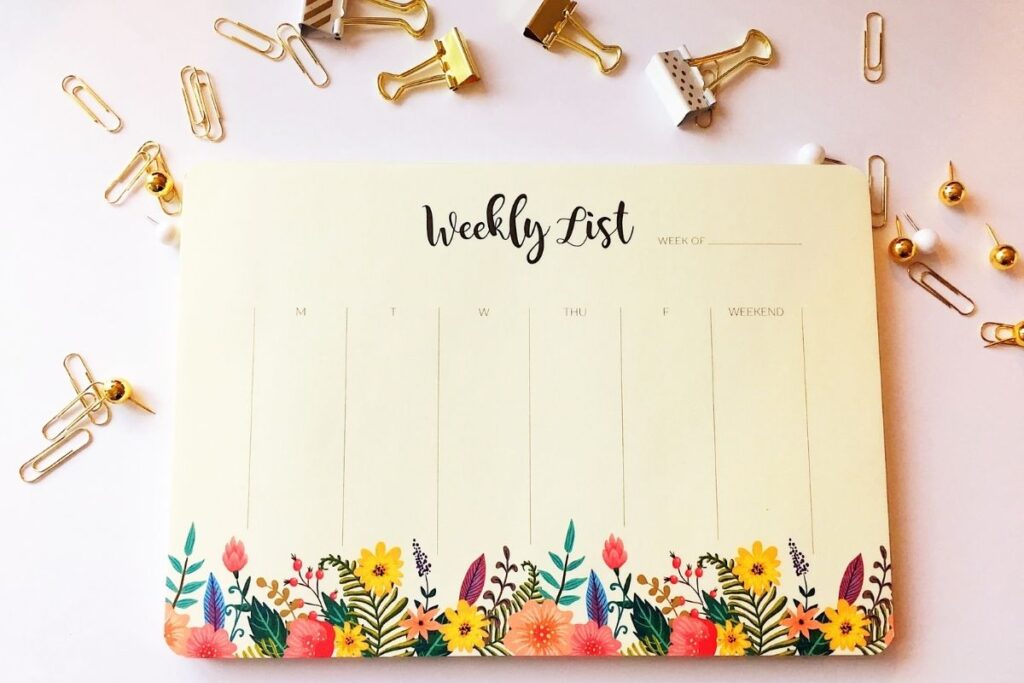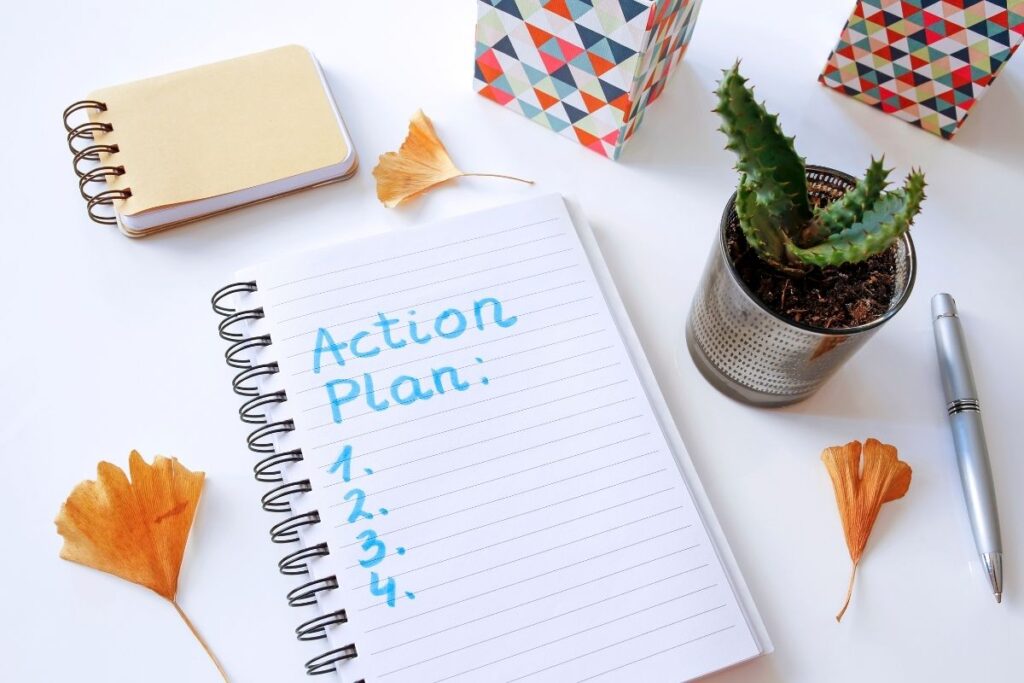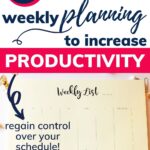Inside: Want to learn how to increase productivity by planning for the week ahead? In this post, we’ll look at how to get more done by setting aside time to plan.
Life can get busy sometimes. Between work, family, friends, appointments, hobbies, and other obligations, it can feel like there isn’t enough downtime.
In certain seasons, you may get to a point where you feel like your schedule has gotten completely out of control.
By creating a weekly schedule, you can regain control over your schedule and make adjustments as needed.
By scheduling activities over a week, you’ll give yourself a powerful way to manage your time and balance your life. It may sound simple – and it is.

Why Should I Make A Weekly Plan?
Let’s start with the big question first. Why should you make a weekly schedule?
There are many reasons to plan your week in advance. By being thoughtful and intentional with your time, you can make sure you have time for everything on your to-do list – plus more.
If your goal is productivity, a weekly plan can be a total game-changer when it comes to making sure everything gets done.
Not only will you be more productive, but you’ll be less stressed as you tackle those plans.
By knowing where you need to be and what you’re doing next, and anticipating the time it’s going to take to accomplish everything, you’ll be at ease as you navigate your week.
First Things to Do to Start Planning Your Week to Be Productive
When it comes to planning for the week ahead, where do you start?
For many, figuring out when to begin can be the most overwhelming part of the weekly planning process. If you don’t have a system in place to plan your week, where do you start?
1. Choose A Day To Start Your Weekly Plan
The best place to start is by figuring out when you’re going to start. Look at a calendar and pick a day that feels reasonable.
Some people will ask, “does Sunday start the week?” And the answer is, it depends. Some people choose a Sunday start while others start their week on a Monday.
There isn’t a right or wrong with how you structure your week. At this point, you’re looking to pick your first planning day.
Some people will choose Sundays for their day to plan for the week ahead. Other people will opt for Fridays or Saturdays. The day itself doesn’t matter.
You’re looking to pick a time that will work for your schedule when you can reflect on the past week and plan for the coming week.
You may want to research different planners first, or investigate different time management strategies first – and that’s OK!
Either way, by choosing a day to start, you’ll take your first step toward organization.

2. Make A Weekly Planning Session Commitment
Another great place to start as you try to be more productive? Simply committing to a weekly planning session.
Carve out the time for yourself – thirty minutes, an hour, or however long you need.
Visit your favorite coffee shop or a quiet place where you can focus, and commit to spending that time focused on planning your next week.
It may be difficult at first, but as you make it a habit, your weekly planning session will feel like second nature.
If you try planning on Saturday mornings, but that doesn’t end up working well, it’s ok to move that to a different day. At this point, you’re working to create a regular routine, but you can change things up as needed to create a schedule that works for you.
How to Plan Your Week to Be Productive
When you’re planning for the week ahead, you’re probably doing that with the goal of being productive. And who doesn’t want to be productive?
By making progress, we can relieve some of that burden and take away some of our stress.
If you want to plan your week to be as productive as possible, here’s how to do it:
3. Do a brain dump
A brain dump is an excellent place to start to plan your weekly schedule.
And it’s exactly what it sounds like – the process of dumping all of the little ideas and distractions out of your brain and onto some paper so you can think more clearly.
I call this an All the Things list in the Simply Scheduled Workbook, which is a great resource for helping you to create your weekly plan.
Write (or type) a list of everything you know you need to do. Plans with friends, bills to pay, appointments to schedule, groceries to shop for. The more comprehensive, the better.
From there, you can…

4. List your weekly priorities
So you’ve got a big list of everything you need to do. Now, it’s time to prioritize.
Look over that list and figure out what tasks are going to take priority. What will be the most important things for you to focus on?
If you’re focused on climbing the corporate ladder, those priorities might be work-related – project delivery deadlines, a big presentation, or some other looming task.
When mental health and wellness are more of a focus for you, your priorities may include cooking healthy meals and finding time to meditate.
If you have young children, your priorities may be staying on top of their schedule and needs in this season of your life.
5. Schedule activities over the week
After you’ve identified your top priorities, it’s time to start scheduling your week.
Start with those items you identified as top priority. Since those are the most important things for you, you’ll want to make sure you have plenty of time to accomplish them.
Once your priorities are scheduled, see what else you have time for, but don’t forget to include this very important aspect of your schedule…
6. Schedule time for sleep and relaxation
What’s one important component to your weekly plan that you absolutely shouldn’t forget?
Sleep, relaxation, and down-time.
Many of us don’t actually schedule time for these activities on our calendars – which can lead to stress, exhaustion, and poor sleep. We tend to focus on adding more to the schedule to increase productivity, but sometimes the most productive thing to do is rest.
Instead, when you’re scheduling activities over a week, make sure you add in some downtime to rest, relax, and recharge. Your mind and body will thank you later.
There are various ways to slow down. Choose the ones that are most appealing to you and make sure to add even just a few of them to your schedule.

How to Be Productive and Stick to Your Weekly Plan
Your weekly plan is only going to work if you can make yourself follow it.
If you want to be productive and truly commit to making the most of each week, you need to…
7. Make sure your plan is achievable
By setting unrealistic goals for yourself, you’re only setting yourself up to fail, which doesn’t feel good or motivating.
Instead, make sure your plan is something you can realistically achieve in a week.
By over-filling your schedule, not leaving time for important commitments, or simply forgetting to rest, you’ll end up stressed and unhappy.
8. Follow your plan – whether you feel like it or not
Sometimes, you just aren’t going to feel like doing the stuff you’ve committed to.
But do it anyway!
By sticking to your plan, whether or not you feel like it, you’ll make it even more of a habit – something you can’t quickly ignore or skip.
You’ll be more productive, and you’ll accomplish everything you actually set out to do. Even if it feels like a struggle, you’ll be glad you followed your plan at the end of the day.
9. Schedule tasks you’ll procrastinate on for Monday
A smart strategy for tackling those things you really don’t want to do involves making them the first things you tackle.
It can feel like you use up a lot more time and energy on those not-so-exciting tasks. By getting them out of the way first, you’ve got the most energy and willpower to make it happen.
And after they’re done? Chances are, you’ll feel way less stressed and a lot more excited about the rest of your week.

10. Choose a planning system that works for you
Some people love having a yearly planner and it works great for them. Other people love making lists and writing things down, but dated planners aren’t a great fit for them, which was why I created the Simply Scheduled Workbook.
And others prefer digital options like Google calendar and Evernote.
There isn’t a right or wrong answer to which system is best. The best system is the one that works for you and that you’ll stick with.
Why Planning Your Week Ahead Helps You Be More Productive
One of the biggest benefits to planning your week? You’re able to be more productive.
And when you’re staring down a long list of to-dos and obligations, productivity is your secret weapon for getting through it all.
Planning your week ahead also helps you to be more intentional with how you’re spending your time.
Having a weekly schedule relieves mental stress and anxiety
With no real schedule, it’s easy for anxiety to creep in. Knowing that you have obligations and commitments but aren’t sure when they’re going to happen is stressful.
And running the risk of dropping the ball and forgetting about something important can eat away at you if you aren’t careful.
Maintaining a weekly schedule makes it easy for you to keep stress and anxiety at bay. By knowing where you need to be, when you need to be there, and how much time you have to rest and relax, you can have a productive week without feeling frazzled.
Having a weekly schedule validates your ability to say “no”
Many people struggle to keep their weeks under control because they just don’t know how to say “no.”
When someone suggests plans or asks for a favor, or something else comes up, it can be difficult to decline when you aren’t clear on your schedule or priorities.
But if you plan your week in advance, you’ll feel more empowered to say “no” to those random obligations that you may not be too excited to accept. A quick “Sorry, I have plans!” is all it takes.
Planning Your Week Ahead of Time Takes a Lot of Stress and Pressure Off of You!
If you aren’t already planning your weeks – it’s time to start!
From feeling less stressed, finding more balance, and being more productive, there are clear benefits to planning your week ahead of time.
Embrace a weekly plan and start scheduling your priorities today!
If you want a resource that will help you with planning for the week ahead, check out the Simply Scheduled Workbook.
Sign up on the form below to get weekly tips on simplifying and living intentionally sent straight to your inbox! You’ll also get the free Priorities Assessment Worksheet to help you ensure that your schedule reflects your priorities in life.



Great post Julianna, I love planning and I actually have two planners. I use a day designer for my everyday stuff and I use a happy planner for my blog stuff.
It really helps me to stay on task and get things done when I know what I’m doing cause I wrote it down.
I really liked how you said to schedule rest and relaxation. I have a little rest planned each day and hobbies I enjoy I plan to do each day or regularly.
I think a planner is a great way to stay motivated if you use it but I also think it’s a great way to look back and remember what you have done and accomplished. That helps me feel more positive about my life and my efforts.
A great read
Very insightful and diligent. Thanks for sharing this with the world.